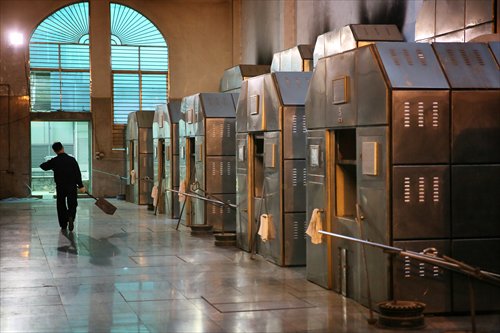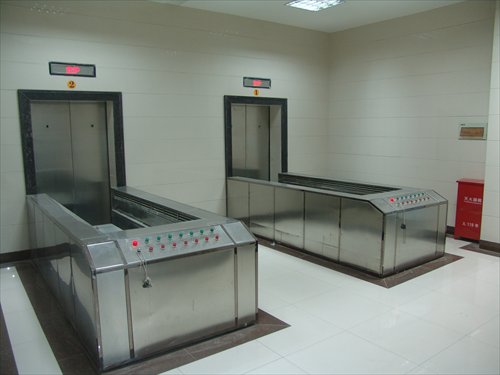Ashes to ashes
A hot, dusty glimpse inside Shanghai’s crematorium industry

A cremation worker in a furnace room Photo: CFP
Furnaces at the Shanghai Yishan Funeral Parlor Photo: Courtesy of the Yishan Funeral Parlor
In a city with over 120,000 annual deaths, Shanghai's Yishan Funeral Parlor sees between 150 to 300 bodies come in every day, nearly half the city's daily total, for which they are responsible for cremating.
Cremation workers at Yishan start their business every morning at 8:30 am and don't finish until 12 hours later. At any moment, at least 20 furnaces are in simultaneous operation, with another 5 being prepped or cleaned. On average, each employee is responsible for 20 bodies per day.
Xu Cheng, aged 29, has been working at Yishan for five years. He is the team leader of 20 cremation workers and one of 47 employees in the funeral parlor's cremation department. Each of the department's staff is responsible for different procedures of the cremation process, ranging from furnace maintenance to customer service.
Unfortunately for this large team of workers, the crematorium is not equipped with air conditioning, which makes their indoor working environment even hotter than the current 38 C summer soup outdoors. With 20 furnaces in constant operation, temperatures in the crematorium hover all day in the 50 C range.
"In the summer, our clothes always get soaked in sweat while working beside these furnaces, which are operated almost all the time at the same time," shouts Xu above the roar of the furnaces, the noise level of which can reach 100 decibels.
Adding to their misery, the strong odor of rotting corpses putrefying in the heat along with smell of burning flesh creeping out of the furnaces makes for a none-too-pleasant shift for the staff, most who are in their 30s.
A funeral home is not exactly where you'd expect to find so many youngsters, but with a population of 24.25 million, dead bodies are big business in Shanghai - and steady work for anyone who has the constitution for it.
Earth to earth
Cremation has been a major industry in Shanghai since the 1960s. Before then, most bodies were buried in plots. People from other provinces who died in Shanghai were transported by coffin back to their hometowns to be buried in family plots. But in 1966 city authorities ordered that all corpses regardless of their origin had to be cremated in Shanghai. Foreigners can be transported back to their home countries in coffins. Currently there are 15 funeral homes throughout the municipality, with a majority located out in the suburban districts.
Downtown, the cremations of the three funeral homes, including Shanghai Yishan Funeral Parlor, Shanghai Longhua Funeral Parlor and Shanghai Baoxing Funeral Parlor, are handled exclusively by Yishan. Nearly 51,500 bodies are cremated at Yishan every year, with 25,000 coming from Longhua and another 20,000 from Baoxing.
Clients can choose between two kinds of furnaces to cremate their deceased relatives. An ordinary furnace is priced at 180 yuan ($28.99) and the other, which allows clients to pick up the bone ash themselves, is priced at 600 yuan. It costs the funeral home approximately 400 yuan in operational costs to cremate one body.
Liu Yong, 32, has been working at Yishan for 10 years. He studied cremation technology at a vocational school before joining the funeral home. "My relative, who is a doctor, told me that a cremation major can assure me a stable job. So I chose the major and I joined the funeral home after graduation," said Liu.
Due to the perception of the funeral industry by China's largely superstitious society, finding a job at a funeral parlor is not as easy as just getting an introduction as in other guanxi (special relationships) based professions. And even those job hunters who do manage to arrange an interview at a funeral home are known to back out at the last minute.
"Sometimes when we notify a dozen candidates of a job interview here, only half finally show up. Even if they were the ones who sent us their resumes, they change their minds at the last minute, or use the excuse that their family members or their lovers object," said Cao Baofu, Party branch secretary of Yishan Funeral Parlor.
"I know some colleagues who broke up with their potential spouses because of their occupation at a funeral home, so most of our employees tend to find their significant others at the same workplace or in the same industry," said Zhang Yuening, a female receptionist at Yishan's cremation department.
But for those who do accept the job and can handle the fear factor and face-losing societal stigma of working around dead bodies, they take pride in their careers. "I regard it as a normal job with which I can support me and my family. They won't discriminate against me because of my job," said Liu.
"It's difficult for people from other industries to cross over into cremation work, but among cremation workers the turnover is very low. More than 50 percent of funeral industry workers stay for the long-term because of the stability. But the income is absolutely not competitive compared with other occupations," said Cao.

Ashes to ashes
After being burned, bones get mixed with the ashes of other materials such as the shroud and funerary items. But certain bones retain their shape, so crematorium workers will allow relatives to pick out the bones themselves and crack them so that they can fit into the wooden urn.
"Initially I regarded the entire cremation process as just a procedure, from receiving the body to placing the body in the furnace to picking out the ash and placing the ash into an urn," said Liu. "But after so many years, I think cremation is also a ceremony. The relatives of the deceased are present during the two-hour cremation process so all the gentle movements have a sense of presence."
"If our own relatives passed away, we wouldn't throw them heavily or handle them roughly. So we treat each body as our own relative," adds Zhang. "When our clients see their beloved treated gently, they can feel that our service is full of familial affection."
Workers will also meticulously pick out teeth, which tend not to burn easily, with chopsticks from among the ashes on the still-sizzling furnace plate. "The temperature of the plate rises to nearly 1,000 C during the cremation, but even after the cremation the plate is still around 200 C," said Liu.
"Cremation can be regarded as mechanical work. We just open the furnace and burn bodies," said Cao, who admits that he felt a bit terrified of handling corpses and body parts when he first joined the industry. "But we must show our respect to the deceased. If we regard this job only as mechanical work, it will seem to be a factory."
Dust to dust
Immediately following last year's New Year's Eve stampede tragedy along the Bund, all 36 victims were taken to the Yishan Funeral Parlor for cremation. In addition to having to handle the unexpected workload, Yishan employees were surrounded by the heartbreaking grief of so many relatives seeing their young children and grandchildren turned to dust.
"If our sorrowful customers do want to release their emotions by crying, we should just let them cry it out. I think they will feel very uncomfortable if they hold it in. So we just stand to the side and watch and listen silently when they are crying in front of the furnaces," said Zhang.
"When the bones of the deceased are presented to the customers, many cannot accept that just a few days or hours before it was a living person," said Liu. "Most people don't have a positive feeling towards funeral homes to begin with, so they arrive here very confused and emotional. But after we've served them properly, they say 'thank you' from their heart, which shows that we did our work well."
As the nearest residential area is only 100 meters away from the funeral home, Yishan tries to keep good relations with residents by controlling emissions according to strict environmental regulations. To this end, job applicants must obtain proper qualifications before they can work at a funeral home.
"If the skill of the worker is not good enough, it will show in the smoke coming from the chimney of the furnace and in the odor in the vicinity. We require our cremation workers to finish each cremation within one to two hours," said Liu. "If a crematorium has to spend three hours burning a body, they are unqualified."
"I regard my work as important as the work of doctors," said Liu. "All people must go through the life cycle of birth, aging, sickness and death. While doctors take care of the birth and sickness, we take care of people's death."
"The slogan of our cremation department is to be the most beautiful people who see off the deceased," adds Zhang on a positive note. "We are the real last ones to see a person disappear from this world."